动词时态串烧
图片预览
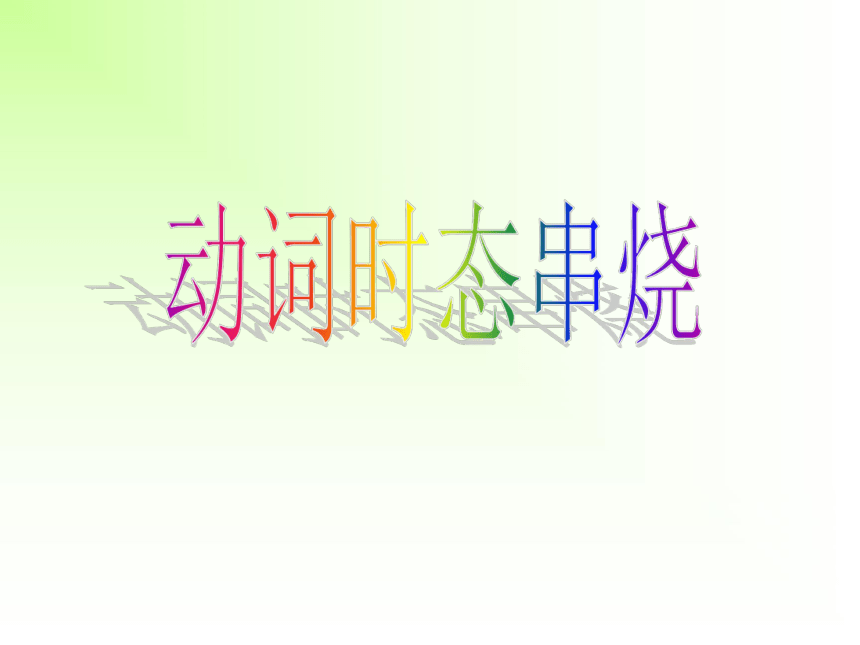
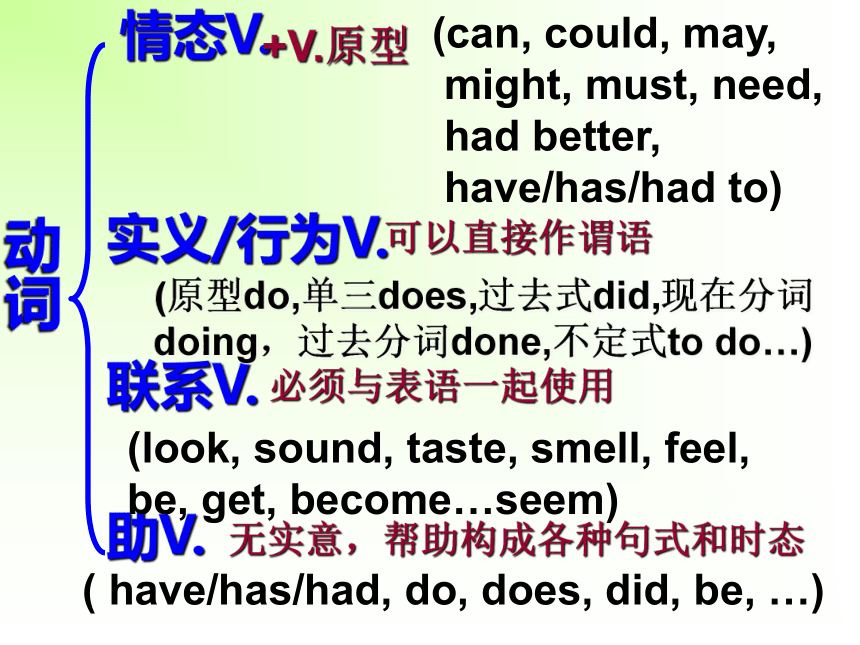
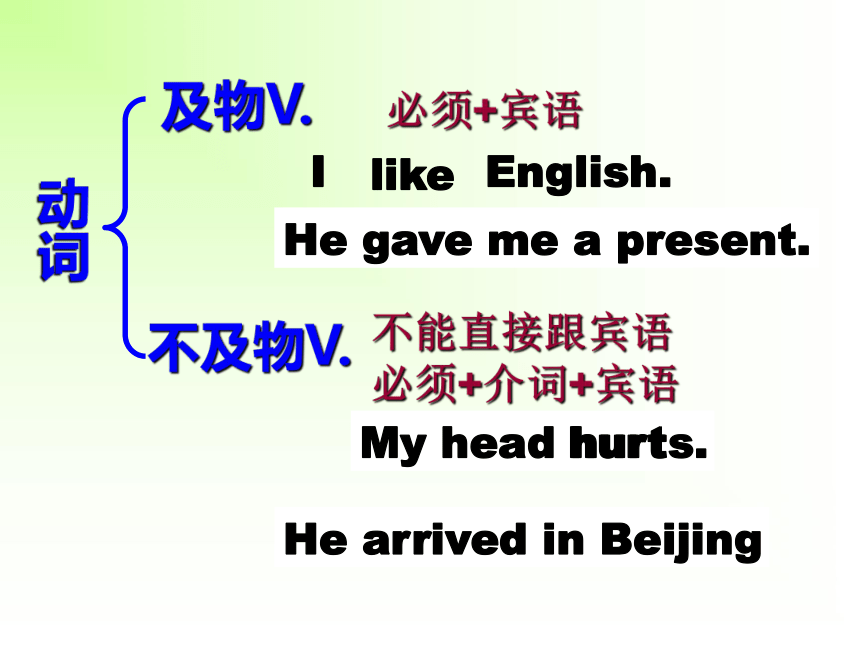
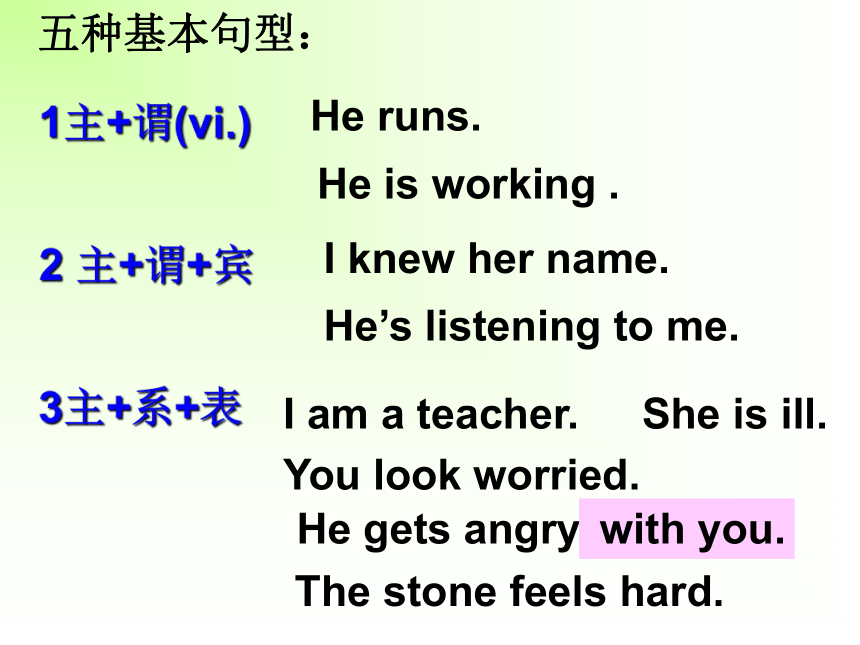
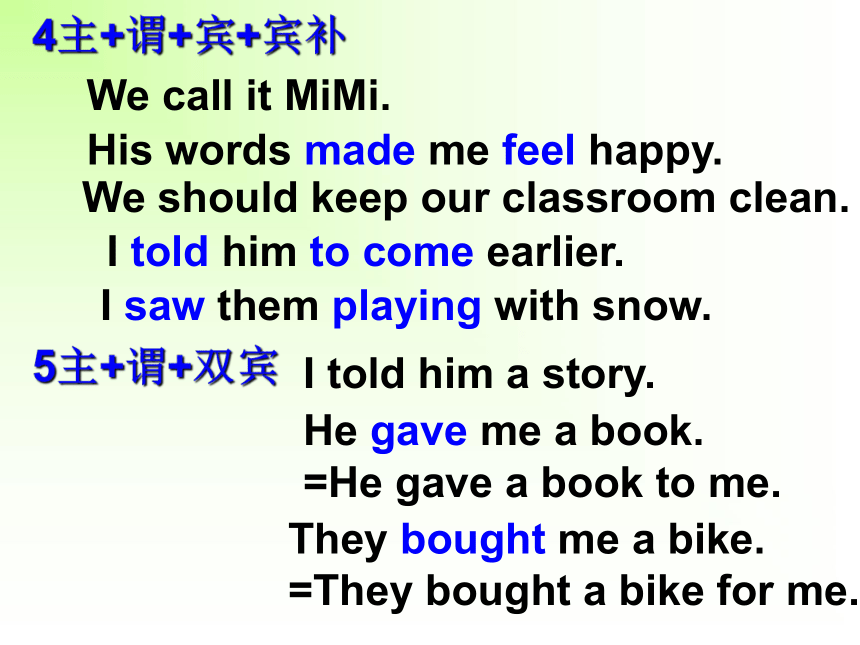
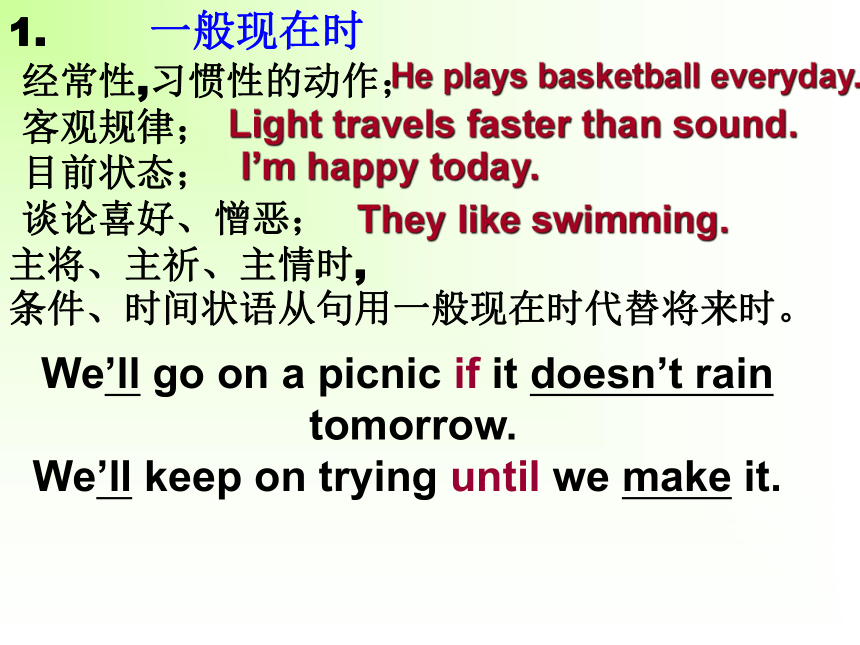
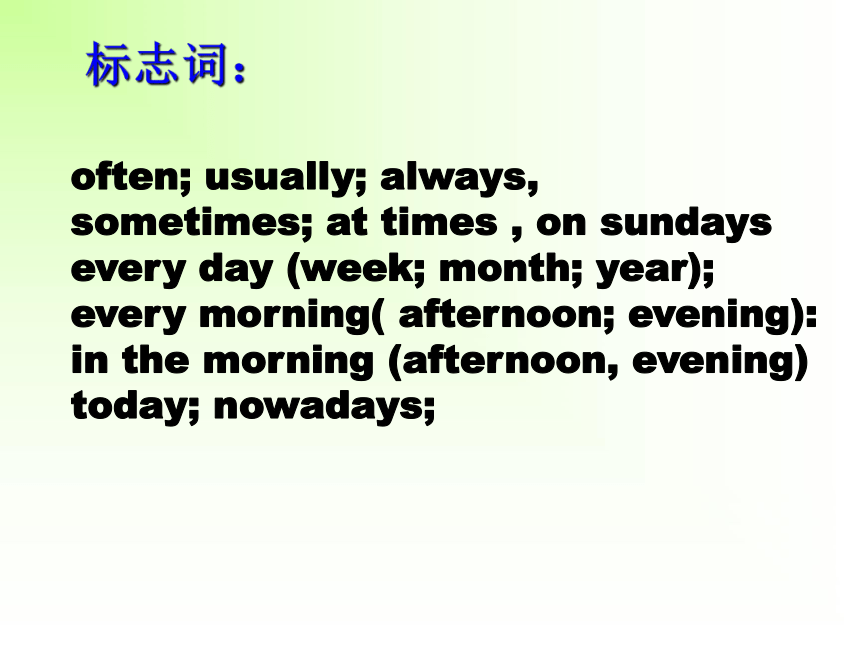
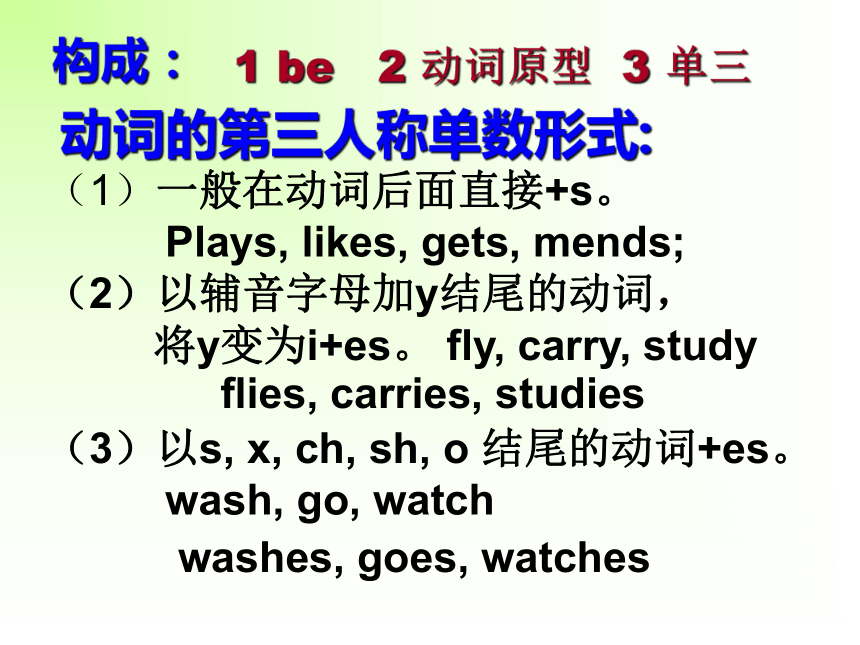
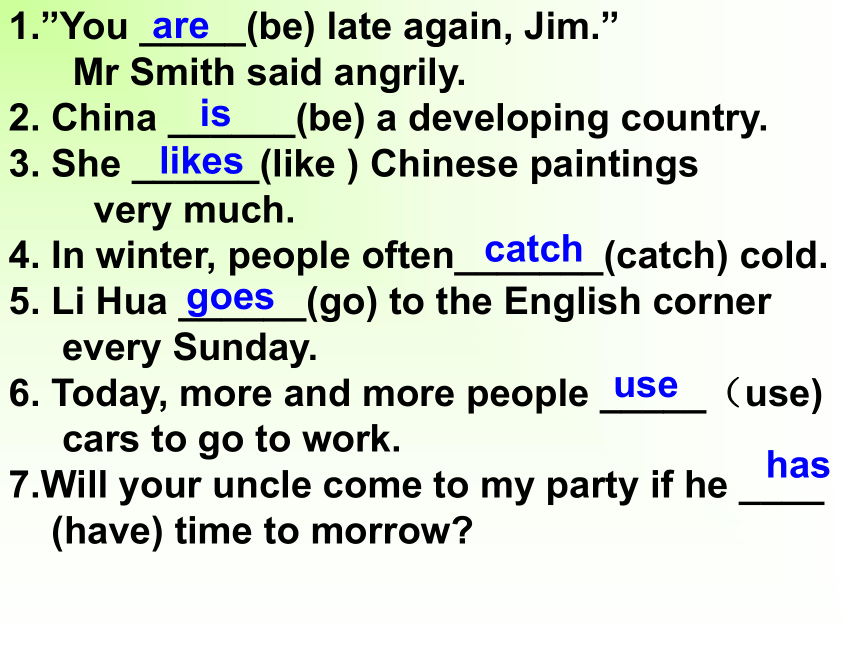
文档简介
课件27张PPT。动词时态串烧情态V.实义/行为V.联系V.助V.+V.原型(can, could, may,
might, must, need,
had better,
have/has/had to)无实意,帮助构成各种句式和时态( have/has/had, do, does, did, be, …)可以直接作谓语(原型do,单三does,过去式did,现在分词
doing,过去分词done,不定式to do…)必须与表语一起使用(look, sound, taste, smell, feel,
be, get, become…seem)动词动词及物V.不及物V.必须+宾语不能直接跟宾语
必须+介词+宾语 likeI English. giveHe gave me a present. arriveHe arrived in BeijingMy head hurts. hurt五种基本句型:1主+谓(vi.)He runs.2 主+谓+宾I knew her name.3主+系+表He’s listening to me.I am a teacher.She is ill.You look worried.He gets angry.He is working . with you.The stone feels hard.5主+谓+双宾I told him a story.He gave me a book.
=He gave a book to me.They bought me a bike.
=They bought a bike for me.4主+谓+宾+宾补His words made me feel happy.We should keep our classroom clean.I told him to come earlier.I saw them playing with snow.We call it MiMi.1. 一般现在时
经常性,习惯性的动作;
客观规律;
目前状态;
谈论喜好、憎恶;
主将、主祈、主情时,
条件、时间状语从句用一般现在时代替将来时。
We’ll go on a picnic if it doesn’t rain
tomorrow.
We’ll keep on trying until we make it.He plays basketball everyday.Light travels faster than sound.I’m happy today.They like swimming. often; usually; always,
sometimes; at times , on sundays
every day (week; month; year);
every morning( afternoon; evening):
in the morning (afternoon, evening)
today; nowadays; 标志词: 动词的第三人称单数形式:
(1)一般在动词后面直接+s。
Plays, likes, gets, mends;
(2)以辅音字母加y结尾的动词,
将y变为i+es。 fly, carry, study
(3)以s, x, ch, sh, o 结尾的动词+es。
wash, go, watch flies, carries, studies washes, goes, watches构成:1 be 2 动词原型 3 单三1.”You _____(be) late again, Jim.”
Mr Smith said angrily.
2. China ______(be) a developing country.
3. She ______(like ) Chinese paintings
very much.
4. In winter, people often_______(catch) cold.
5. Li Hua ______(go) to the English corner
every Sunday.
6. Today, more and more people _____(use)
cars to go to work.
7.Will your uncle come to my party if he ____
(have) time to morrow?areislikescatchgoesuse has 一般过去时
过去经常发生的动作;
过去的状态
过去某一时间发生了的动作
yesterday morning (afternoon, evening)
last night (week, month; year; );
three days (years) ago;
the day before yesterday;
once…;
one morning; one day;
in 2000(in the year 2000);
1.He _____(come)to England last year.
2.One day, an old man ______(go) to the
market.
3. Once she ______ (buy) a doll for her
daughter.
4. The two teams _____( have ) a football
match two years ago.
5. They ______(get) the championship in
2002.
6.Yesterday, he ____ (not go) to work,
because he ____ (be) ill in bed.camewentboughthadgot didn’t go was 一般将来时
将来要发生的动作;或存在的状态
语意(“准备…” “打算…” “要…”);
主将从现(复合句)
someday,soon, at once
tonight, this evening
tomorrow; from now on
the day after tomorrow;
next day (week; month; year; )
in 20 minutes; in a year;…
in the future
when I grow up 主将从现
structures:
will + v.(动词原形)
be going to + V.(动词原型)
位移动词进行时表将来
be going/coming/leaving/sending/
flying…
It _____ (be) snowy in the coming days.
We _____ (have) the final exam next month.
I _____ (try) my best to catch up with
others in learning English.
4. If it ______(rain) tomorrow, we _____
(not visit) that famous university.
5. In the coming new year, he _____ (go)
abroad with his family.
6. The Whites are on the plane now. They
_____ (fly) to Paris. will bewill havewill tryrainswon’t visitwill gowill fly
are flying 现在进行时
当前或当前阶段内正在发生、进行的动作;
字面或理解中含“正;正在”
now;
at this time
at this moment;
look; listen; it’s 8:00
at present; these days;
* * * be (am ; is ; are) + doing现在分词的构成:
1 +ing
去e +ing
双写+ingworking , looking, standing… taking, leaving, having, graduating, putting, stopping, beginning
swimming, sitting,… wait ?ingChina __________ (become) stronger
and stronger now.
2. Pollution ________ (get) worse and
worse in this town these days.
3. Look! The famous reporter ______
______ (interview) the president.
4. Listen! Someone ________ (walk)
towards us.
5. Chinese people _________(live) a
happy life at present.is becomingis gettingisinterviewingis walkingare living 过去进行时
在过去的时间内正在发生的动作;
字面中含“当时正在;那时正在…”等意义;
then; at that time;
(at) this time yesterday;
at 10:00 last Sunday;
While we were studying in the room,
When I got back home, my mother
was writing something on the paper.
We knew that they were travelling
on plane;
They found that the dirty water was polluting the lake.
* * *
Was/ were + doingMr Karter ________ (run) in the open
air this time yesterday.
2.This time last year, we ___________
(study) in Grade 2.
3. We _________ (have) a maths class at
9 yesterday.
4. While they __________ (watch) TV ,
we _____busy_______(go) over English
words.
5.When he got to the airport, the plane
________ (take) off.
6.We could see that girls’ team _______
(win) 5-0.was runningwere studyingwere havingWere watchingwere goingwas takingwas winning 现在完成时
过去发生的动作,1.持续到现在 2.所产生的影响和结果。
nowfor two years; since two years ago;
since he came to China, ever since
up to now; by now; so far;
in the past two years;
during the past two yearstwo years ago字面中含
“已经;已然” “曾经” “先前”
“从来没有” “刚刚…” “已…回了” 等。
already;
ever;
yet;
before;
never;
just;
many/several /3 times;
recently.I have already done it.Have you done it yet?Structure:
have / has+ doneHe has thrown away the rubbish.What has he done with the rubbish?She ______ (read) the novel several times.
_____you ever ____ (be) to the Great Wall?
We _______ (learn) nearly 3000 words by now.
So far, China ______ (send) up at least 6
spaceships into the space.
5.His father _________ (join) the Army since
18 years ago.
6.They _________ (not finish) building the road yet.
7.Mr White _______ (teach) French in this
school during/in the past 5 years.
8.What a pity! He _____never ______ (eat)
a “zongzi”!
9. I__________ (not hear) from her recently. has readhave beenhave learnthas senthas been inhaven’t finishedhas taughthas eatenhaven’t heard瞬间动词转换成延续性动词buy-have(have had); borrow-keep( have kept)
Come/go/ arrive –be (have been);
become-be (have been)die- be dead; leave- be away from;
begin- be on; finish- be over;
close- be closed; open- be open;
fall asleep- be asleep; fall ill/sick- be ill;
join the Army / Party / League / society /club
--be a soldier / League member
/Party member / a member of
=be in… Pat liked to make things. She _____
(like)to work with her hands. She said,”
Today I ____ (make) a face.”
Pat worked and _____ (work). Soon
she had made a nice face. When it was
____ (do), Pat said, “This is a good face.
This ____ (be) my face!” Pat was very
pleased.likedwill makeworkeddoneis “Please read me a story,” said Ana.
Grandfather was going ____ (read) her
the story, Three Little Pigs. Ana said, “
I ____ (hear) about the story.
Please read me another one.”
Grandfather read her a new one.
“How did you like the story, Ana?
Are you _____ (listen) to me now?”
asked Grandfather. Ana ___
(not answer)Grandfather looked at ana
and began to laugh. Ana was not
listening at all. She ____ (sleep) there.to readhave heardlisteningdidn’t answerwas sleeping
might, must, need,
had better,
have/has/had to)无实意,帮助构成各种句式和时态( have/has/had, do, does, did, be, …)可以直接作谓语(原型do,单三does,过去式did,现在分词
doing,过去分词done,不定式to do…)必须与表语一起使用(look, sound, taste, smell, feel,
be, get, become…seem)动词动词及物V.不及物V.必须+宾语不能直接跟宾语
必须+介词+宾语 likeI English. giveHe gave me a present. arriveHe arrived in BeijingMy head hurts. hurt五种基本句型:1主+谓(vi.)He runs.2 主+谓+宾I knew her name.3主+系+表He’s listening to me.I am a teacher.She is ill.You look worried.He gets angry.He is working . with you.The stone feels hard.5主+谓+双宾I told him a story.He gave me a book.
=He gave a book to me.They bought me a bike.
=They bought a bike for me.4主+谓+宾+宾补His words made me feel happy.We should keep our classroom clean.I told him to come earlier.I saw them playing with snow.We call it MiMi.1. 一般现在时
经常性,习惯性的动作;
客观规律;
目前状态;
谈论喜好、憎恶;
主将、主祈、主情时,
条件、时间状语从句用一般现在时代替将来时。
We’ll go on a picnic if it doesn’t rain
tomorrow.
We’ll keep on trying until we make it.He plays basketball everyday.Light travels faster than sound.I’m happy today.They like swimming. often; usually; always,
sometimes; at times , on sundays
every day (week; month; year);
every morning( afternoon; evening):
in the morning (afternoon, evening)
today; nowadays; 标志词: 动词的第三人称单数形式:
(1)一般在动词后面直接+s。
Plays, likes, gets, mends;
(2)以辅音字母加y结尾的动词,
将y变为i+es。 fly, carry, study
(3)以s, x, ch, sh, o 结尾的动词+es。
wash, go, watch flies, carries, studies washes, goes, watches构成:1 be 2 动词原型 3 单三1.”You _____(be) late again, Jim.”
Mr Smith said angrily.
2. China ______(be) a developing country.
3. She ______(like ) Chinese paintings
very much.
4. In winter, people often_______(catch) cold.
5. Li Hua ______(go) to the English corner
every Sunday.
6. Today, more and more people _____(use)
cars to go to work.
7.Will your uncle come to my party if he ____
(have) time to morrow?areislikescatchgoesuse has 一般过去时
过去经常发生的动作;
过去的状态
过去某一时间发生了的动作
yesterday morning (afternoon, evening)
last night (week, month; year; );
three days (years) ago;
the day before yesterday;
once…;
one morning; one day;
in 2000(in the year 2000);
1.He _____(come)to England last year.
2.One day, an old man ______(go) to the
market.
3. Once she ______ (buy) a doll for her
daughter.
4. The two teams _____( have ) a football
match two years ago.
5. They ______(get) the championship in
2002.
6.Yesterday, he ____ (not go) to work,
because he ____ (be) ill in bed.camewentboughthadgot didn’t go was 一般将来时
将来要发生的动作;或存在的状态
语意(“准备…” “打算…” “要…”);
主将从现(复合句)
someday,soon, at once
tonight, this evening
tomorrow; from now on
the day after tomorrow;
next day (week; month; year; )
in 20 minutes; in a year;…
in the future
when I grow up 主将从现
structures:
will + v.(动词原形)
be going to + V.(动词原型)
位移动词进行时表将来
be going/coming/leaving/sending/
flying…
It _____ (be) snowy in the coming days.
We _____ (have) the final exam next month.
I _____ (try) my best to catch up with
others in learning English.
4. If it ______(rain) tomorrow, we _____
(not visit) that famous university.
5. In the coming new year, he _____ (go)
abroad with his family.
6. The Whites are on the plane now. They
_____ (fly) to Paris. will bewill havewill tryrainswon’t visitwill gowill fly
are flying 现在进行时
当前或当前阶段内正在发生、进行的动作;
字面或理解中含“正;正在”
now;
at this time
at this moment;
look; listen; it’s 8:00
at present; these days;
* * * be (am ; is ; are) + doing现在分词的构成:
1 +ing
去e +ing
双写+ingworking , looking, standing… taking, leaving, having, graduating, putting, stopping, beginning
swimming, sitting,… wait ?ingChina __________ (become) stronger
and stronger now.
2. Pollution ________ (get) worse and
worse in this town these days.
3. Look! The famous reporter ______
______ (interview) the president.
4. Listen! Someone ________ (walk)
towards us.
5. Chinese people _________(live) a
happy life at present.is becomingis gettingisinterviewingis walkingare living 过去进行时
在过去的时间内正在发生的动作;
字面中含“当时正在;那时正在…”等意义;
then; at that time;
(at) this time yesterday;
at 10:00 last Sunday;
While we were studying in the room,
When I got back home, my mother
was writing something on the paper.
We knew that they were travelling
on plane;
They found that the dirty water was polluting the lake.
* * *
Was/ were + doingMr Karter ________ (run) in the open
air this time yesterday.
2.This time last year, we ___________
(study) in Grade 2.
3. We _________ (have) a maths class at
9 yesterday.
4. While they __________ (watch) TV ,
we _____busy_______(go) over English
words.
5.When he got to the airport, the plane
________ (take) off.
6.We could see that girls’ team _______
(win) 5-0.was runningwere studyingwere havingWere watchingwere goingwas takingwas winning 现在完成时
过去发生的动作,1.持续到现在 2.所产生的影响和结果。
nowfor two years; since two years ago;
since he came to China, ever since
up to now; by now; so far;
in the past two years;
during the past two yearstwo years ago字面中含
“已经;已然” “曾经” “先前”
“从来没有” “刚刚…” “已…回了” 等。
already;
ever;
yet;
before;
never;
just;
many/several /3 times;
recently.I have already done it.Have you done it yet?Structure:
have / has+ doneHe has thrown away the rubbish.What has he done with the rubbish?She ______ (read) the novel several times.
_____you ever ____ (be) to the Great Wall?
We _______ (learn) nearly 3000 words by now.
So far, China ______ (send) up at least 6
spaceships into the space.
5.His father _________ (join) the Army since
18 years ago.
6.They _________ (not finish) building the road yet.
7.Mr White _______ (teach) French in this
school during/in the past 5 years.
8.What a pity! He _____never ______ (eat)
a “zongzi”!
9. I__________ (not hear) from her recently. has readhave beenhave learnthas senthas been inhaven’t finishedhas taughthas eatenhaven’t heard瞬间动词转换成延续性动词buy-have(have had); borrow-keep( have kept)
Come/go/ arrive –be (have been);
become-be (have been)die- be dead; leave- be away from;
begin- be on; finish- be over;
close- be closed; open- be open;
fall asleep- be asleep; fall ill/sick- be ill;
join the Army / Party / League / society /club
--be a soldier / League member
/Party member / a member of
=be in… Pat liked to make things. She _____
(like)to work with her hands. She said,”
Today I ____ (make) a face.”
Pat worked and _____ (work). Soon
she had made a nice face. When it was
____ (do), Pat said, “This is a good face.
This ____ (be) my face!” Pat was very
pleased.likedwill makeworkeddoneis “Please read me a story,” said Ana.
Grandfather was going ____ (read) her
the story, Three Little Pigs. Ana said, “
I ____ (hear) about the story.
Please read me another one.”
Grandfather read her a new one.
“How did you like the story, Ana?
Are you _____ (listen) to me now?”
asked Grandfather. Ana ___
(not answer)Grandfather looked at ana
and began to laugh. Ana was not
listening at all. She ____ (sleep) there.to readhave heardlisteningdidn’t answerwas sleeping
同课章节目录
- 词法
- 名词
- 动词和动词短语
- 动词语态
- 动词时态
- 助动词和情态动词
- 非谓语动词
- 冠词
- 代词
- 数词和量词
- 形容词副词及其比较等级
- 介词和介词短语
- 连词和感叹词
- 构词法
- 相似、相近词比较
- 句法
- 陈述句
- 一般疑问句和否定疑问句
- 特殊疑问句及选择疑问句
- 反意疑问句
- 存在句(There be句型)
- 宾语从句
- 定语从句
- 状语从句
- 主谓一致问题
- 简单句
- 并列句
- 复合句
- 主谓一致
- 主、表语从句
- 名词性从句
- 直接引语和间接引语
- 虚拟语气
- 感叹句
- 强调句
- 倒装句
- 祈使句
- 句子的成分
- 句子的分类
- 题型专区
- 单项选择部分
- 易错题
- 完形填空
- 阅读理解
- 词汇练习
- 听说训练
- 句型转换
- 补全对话
- 短文改错
- 翻译
- 书面表达
- 任务型阅读
- 语法填空
- 其他资料
